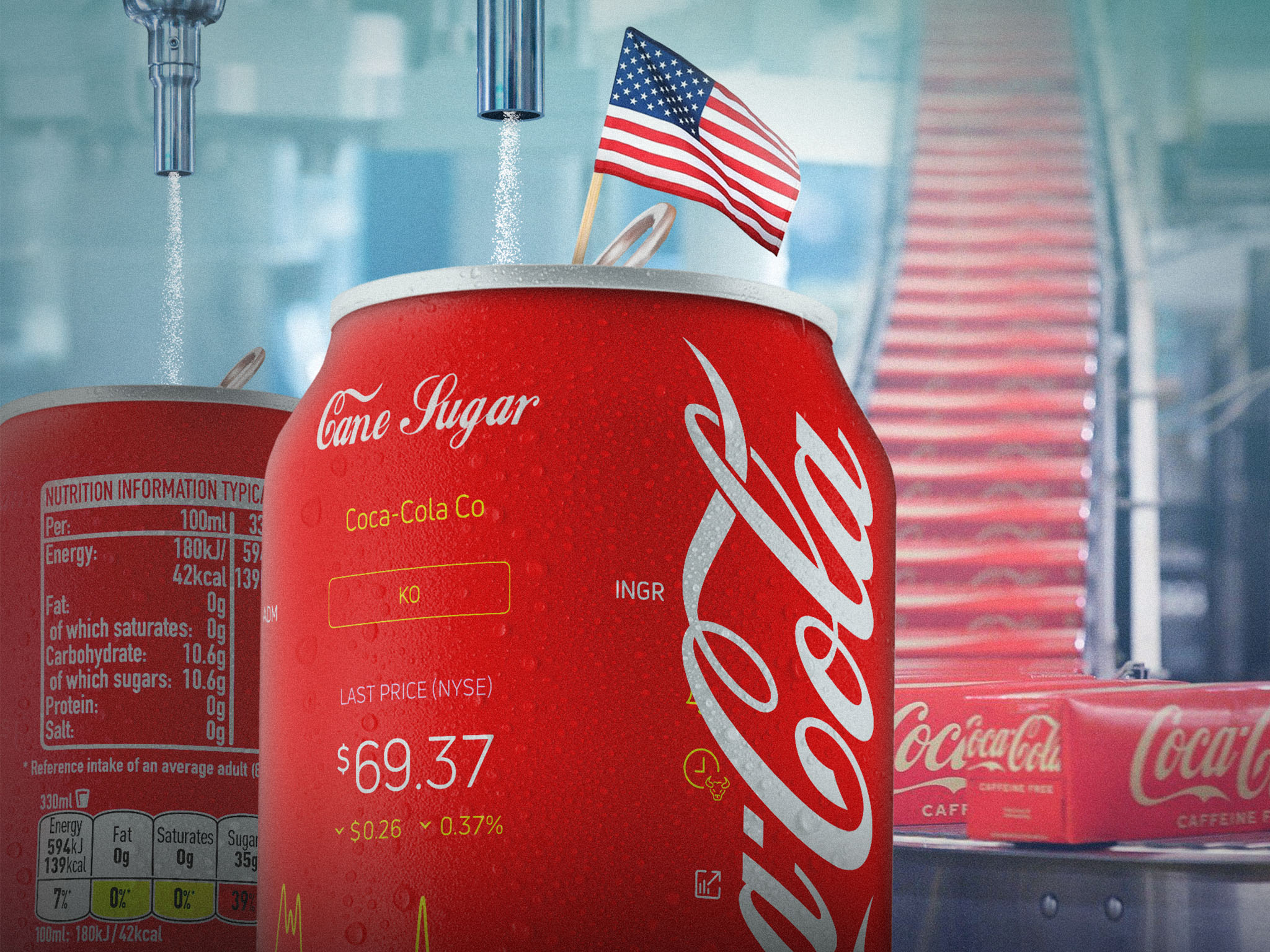The announcement Tuesday that soft drink giant Coca Cola Co. (NYSE: KO) will bring out a version of its namesake Coke beverage made with U.S.-produced cane sugar confirmed a social media post President Trump made last week.
That’s when he praised Coke for agreeing to use “real cane sugar,” adding, “It’s just better!”
The cane sugar version won’t replace Coke made with high-fructose corn syrup but will be an additional product that would hit store shelves sometime in the fall. The announcement was made during Coke’s quarterly earnings call, where the company reported a 1% increase in revenue to $12.5 billion, missing analyst expectations of $12.57 billion. In afternoon trading, shares of Coke were down 0.67% from Tuesday’s opening price of $70.19.
Stocks of makers of corn syrup wobbled briefly after President Trump’s announcement last week that Coke would switch sweeteners but had recovered by Tuesday. Shares of Archer Daniels Midland Co. (NYSE: ADM) were up 2.3 percent from the day before Trump’s social media post, while Ingredion Inc. (NYSE: INGR) was slightly up, to above its pre-announcement price of $134.12.
The move to cane sugar would please Health and Human Services Secretary Robert F. Kennedy Jr., who has called the syrup “a formula for making you obese and diabetic,” and wants to ban the sweetener. While the Food and Drug Administration says there’s no nutritional difference between cane sugar and corn syrup, it’s the widespread use of the high fructose product in all manner of processed foods that can be linked to obesity and inflammation caused by consuming too much sugar. Corn syrup is an added ingredient in condiments, crackers, sports drinks, granola bars, yogurt and even cottage cheese.
While the shift to cane sugar won’t turn Coca Cola into a health food, the taste is considered “cleaner” by fans of Mexican Coke, which is made with cane sugar. Out of more than 6 billion cases sold annually in North America, Coke sells a few million bottles of Mexican Coke in the United States each year as a specialty item. While cane sugar is used in Coke’s Mexican bottling plants, there’s a reason corn syrup is used in the United States: it’s cheaper and more readily available.
Thanks to highly automated U.S. manufacturing methods and generous federal corn subsidies to farmers, corn syrup is about half the price of labor intensive cane sugar.
By one estimate, cane-sugar Coke is likely to cost 10% to 15% more. If Coke were to completely drop corn syrup for cane sugar, the move could wallop wholesalers with an estimated $103 billion in increased costs. The additional cost of cane-sugar Coke would come before any additional expense caused by the U.S. administration’s threatened tariffs on sugar imports from Mexico and Brazil, as well as the fact that the added demand could boost prices on the limited amount of globally available cane sugar.
There aren’t any pure-play stocks in cane sugar but two leading producers – Adecoagro S.A. (NYSE: AGRO) and Cosan SA (NYSE: CSAN) – are holding companies that also operate energy and ethanol operations. Shares of Cosan trended downward after the news about Coke, while Adecoagro saw a brief boost in share price before settling back to earlier levels.
The bigger challenge keeping Coke or any other food processor in making a wholesale move away from corn syrup is that agricultural experts say a shift to cane sugar would be nearly impossible. Domestically, cane sugar is produced in just two states – Florida and Louisiana – and expanding cane production would be complicated and expensive. The U.S. consumes about 12.5 million tons of sugar each year, but produces just 4 million tons of cane sugar, relying on imports from Brazil and other countries, along with sugar produced from beets to fill the void in products other than soft drinks.
Beyond any debate about sweeteners, Coke has been a stalwart in the consumer staples world, producing steady sales growth and share price increases over the years. Coke pays a regular quarterly dividend that increased from $0.485 to $0.51 per share for the last two quarters. The company is a leading “dividend king,” which are stocks that have paid an increasing dividend for at least 50 consecutive years. For Coke, the dividend history extends to 62 straight years. The stock is the longest held by Warren Buffett’s Berkshire Hathaway. Coke regularly beats its earnings estimates, and nearly two dozen analysts rate the shares as “buy” or “strong buy.”




Comments